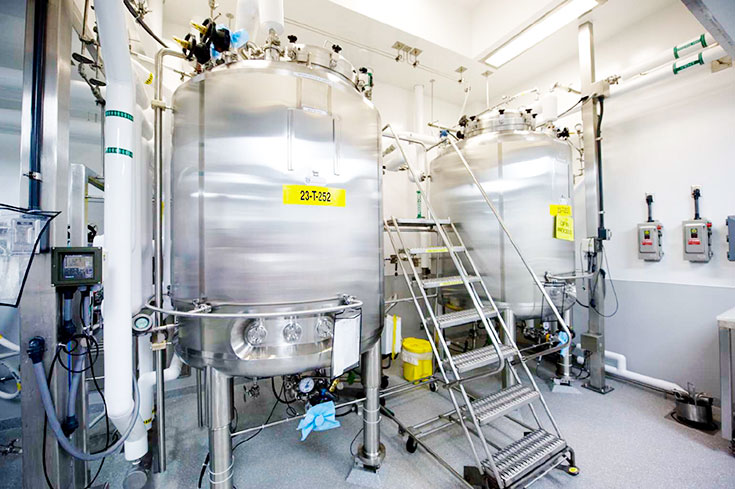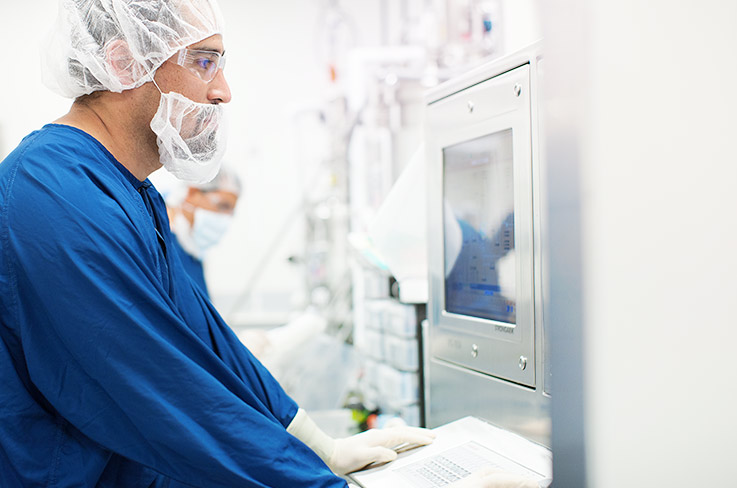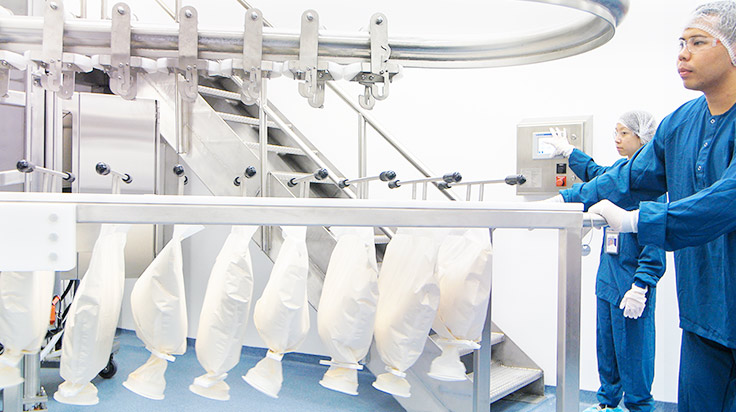For more than 30 years, Amgen has been at the forefront of modern biotechnology, investing in industry-leading technologies to develop and manufacture biologic medications for humans.1 It has built capabilities to make new medicines while continuing to focus on process improvement throughout its manufacturing network. Here are four advances in biotechnology manufacturing that may surprise you.
Volume Varies
Globalization of the biopharmaceutical industry has enabled Amgen to provide breakthrough, life-changing medicines to millions of patients around the world. However, delivering high-quality medicines to more and more patients globally has put increased pressure on the industry’s manufacturing capacities. For example, the volume of a single dose of a biologic medicine now varies widely, as do dosage regimens and patient populations for each medicine. This creates a striking variety of production needs. In some cases, bioreactors used to grow these medicines are as tall as a two-story house; in other cases, they are about the size of a keg of beer.

Drug substance manufacturing bioreactors.
Broader Spectrum of Biotech
There was a time when Amgen made a single biotechnology medicine based on emerging recombinant DNA technology. At the time, pioneering technologies and processes were used to safely manufacture that medicine and reliably get it to patients. Today, Amgen manufactures therapeutic proteins, fusion proteins, fully human monoclonal antibodies, bispecific T-cell engagers, peptibodies, and oncolytic viral therapies. Needless to say, this has created a whole host of new demands. For example, our oncolytic viral therapy must be stored and transported at temperatures ranging between -130ºF to -94ºF.2

Welcome to Next-Gen Biomanufacturing
Process improvement is the touchstone of most any manufacturing operation — and biotech manufacturing is no different. But bringing a number of new process improvements to bear in a new facility, along with new equipment and advanced technologies, is not a trivial undertaking. Amgen is focusing on developing smaller, more flexible, more efficient plants that utilize next-generation equipment to support manufacturing quality, reliability, and better overall performance.
Amgen’s new plant in Singapore is an example of next-generation biomanufacturing, allowing greater speed and efficiency using a smaller manufacturing footprint at reduced cost in time and money to build.3,4 This is the result of reconfigurable technology using higher cellular productivity and cell densities allowing for smaller bioreactors, and use of single-use bioreactors made of disposable plastic. This new type of facility also allows expansion to almost anywhere in the world to support local market needs.

Amgen Singapore biotech manufacturing facility.
Engineering a Biosimilar

Biosimilar medicines are a relatively new category of medicine in the U.S., which has brought new technical challenges to biotechnology. In attempting to copy the originator product, biosimilar manufacturers must independently design their own cell cultures and production steps, which are considered proprietary knowledge.5,6 It is therefore impossible for biosimilar manufacturers to precisely replicate the manufacturing process of the original biologic or the active ingredient of the protein product.6 This creates a unique relationship between a biologic's manufacturing process and the final product approved by regulators.
Biologic medicines are manufactured using living cells that have been engineered to produce therapeutic proteins in large quantities. These proteins are very sensitive to their conditions of synthesis and handling, and a series of critical culturing and purification steps is required to produce a consistent, high-quality active ingredient.5 These complexities also apply to biosimilars, which are approved on the basis of demonstrating similar quality, safety and efficacy to originator biologic medicines.
References
- Data on file, Amgen; 2013.
- Imlygic® Prescribing Information.
- Amgen Inc. “Amgen to Build State-of-the-Art Manufacturing Facility in Singapore.” News release; January 16, 2013. http://investors.amgen.com/phoenix.zhtml?c=61656&p=irol-newsArticle&ID=1775279. Accessed July 25, 2016.
- Data on file, Amgen; 2014.
- U.S. Food and Drug Administration. Guidelines for industry: Biosimilars: additional questions and answers regarding implementation of the Biologics Price Competition and Innovation Act of 2009. 2015. http://www.fda.gov/downloads/Drugs/Guidances/UCM273001.pdf. Accessed July 25, 2016.
- Mellstedt H, Niederwieser D, Ludwig H. The challenge of biosimilars. Ann Oncol. 2008;19(3):411-419.
